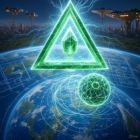Why the Next Superpower Might Be the One That Controls Energy, Not Weapons
For centuries, the dominant powers in the world have been those who wielded weapons, armies, and control over territory. Rome had its legions. Britain ruled with its navy. The United States rose through industrial capacity and nuclear arms. But as the 21st century unfolds, a silent shift is occurring: Power is transitioning from the battlefield to the power grid.
The countries that will lead tomorrow may not be the ones with the most missiles — but the ones with mastery over energy production, storage, and distribution.
🔋 The New Currency of Power: Control Over Energy
Modern civilization runs on energy. From satellites to smartphones, from food production to defense systems — nothing operates without electricity or fuel. In the age of AI, quantum computing, and autonomous systems, energy is not just a utility — it’s sovereignty.
Consider:
- Data centers already consume more energy than entire countries.
- Semiconductor fabs, like those in Taiwan, require uninterrupted power at atomic precision.
- Electric vehicles, crypto mining, smart cities — all are energy-intensive by design.
He who controls energy controls uptime, defense systems, communications, and commerce. That control can be used for leverage — or domination.
🌞 Energy as a Weapon — Already Happening
Energy has already been used as a geopolitical weapon, long before bullets fly:
- Russia’s control of natural gas pipelines gave it influence over much of Europe — until the Ukraine war exposed that vulnerability.
- China dominates rare earth minerals, essential for green tech batteries and wind turbines.
- OPEC’s manipulation of oil production still affects global inflation and recession patterns.
But future superpowers won’t just own resources — they’ll engineer the energy system itself.
⚛️ The Energy Technologies That Will Define Superpowers
There are three arenas where nations are racing not just to innovate, but to dominate:
1. Nuclear Fusion
- Countries like the U.S., China, South Korea, and the EU are investing billions into reactors that mimic the sun’s power.
- Whoever cracks commercial fusion will gain limitless, clean energy — a strategic and economic edge like no other.
2. Thorium Reactors
- Safer and more abundant than uranium, thorium could power entire regions independently.
- India and China are leading this field, while the West hesitates.
3. AI-Controlled Smart Grids
- The future grid isn’t just physical wires — it’s an intelligent, decentralized neural system.
- AI can allocate energy in real-time, secure infrastructure, and predict demand shocks.
- Nations with strong AI and quantum capabilities could weaponize energy distribution, just like cyberattacks today.
🛰️ Energy and the Space Frontier
Space is emerging as the next arena of energy warfare:
- Solar farms in orbit could beam energy back to Earth, bypassing land-based control points.
- Lunar mining for helium-3 — a fusion fuel — may determine which nation controls energy for deep space exploration.
- Powering satellite constellations and space stations requires energy sovereignty beyond Earth.
In this sense, energy superpowers may no longer be Earth-bound.
🌍 A New Geopolitical Order
In the world to come, the balance of power may look like this:
- Countries with fusion reactors supply global clean electricity.
- Nations with energy AI control pricing, access, and protection of digital economies.
- Those who own thorium reserves gain energy independence and export influence.
- Powers with space-based energy systems gain off-world superiority.
Traditional military alliances like NATO may be rivaled by energy alliances — coalitions of fusion nations, AI-powered grids, and clean-tech trade pacts.
The idea of “energy embargo” will take on new meaning — no longer about cutting off oil, but about denying access to fusion algorithms or superconducting materials.
🔐 The Ethical Question: Who Gets the Switch?
As with all power shifts, there’s danger.
- Energy monopolies could replace oil cartels.
- Autocratic regimes might weaponize smart grids to blackout dissidents or enemy nations.
- Tech giants might privatize fusion access, turning energy into a subscription service.
That’s why the battle for the future of energy is also a battle for governance, transparency, and global ethics.
The question is no longer who builds the best weapon, but who gets to decide who has power — literally.
🧠 Final Thought
The age of nuclear weapons defined the 20th century. The age of energy control will define the 21st. Power, both metaphorically and physically, is becoming electricity, heat, and computation — not just firepower.
The next superpower won’t just launch missiles. It will light up the world. Or plunge it into darkness.






